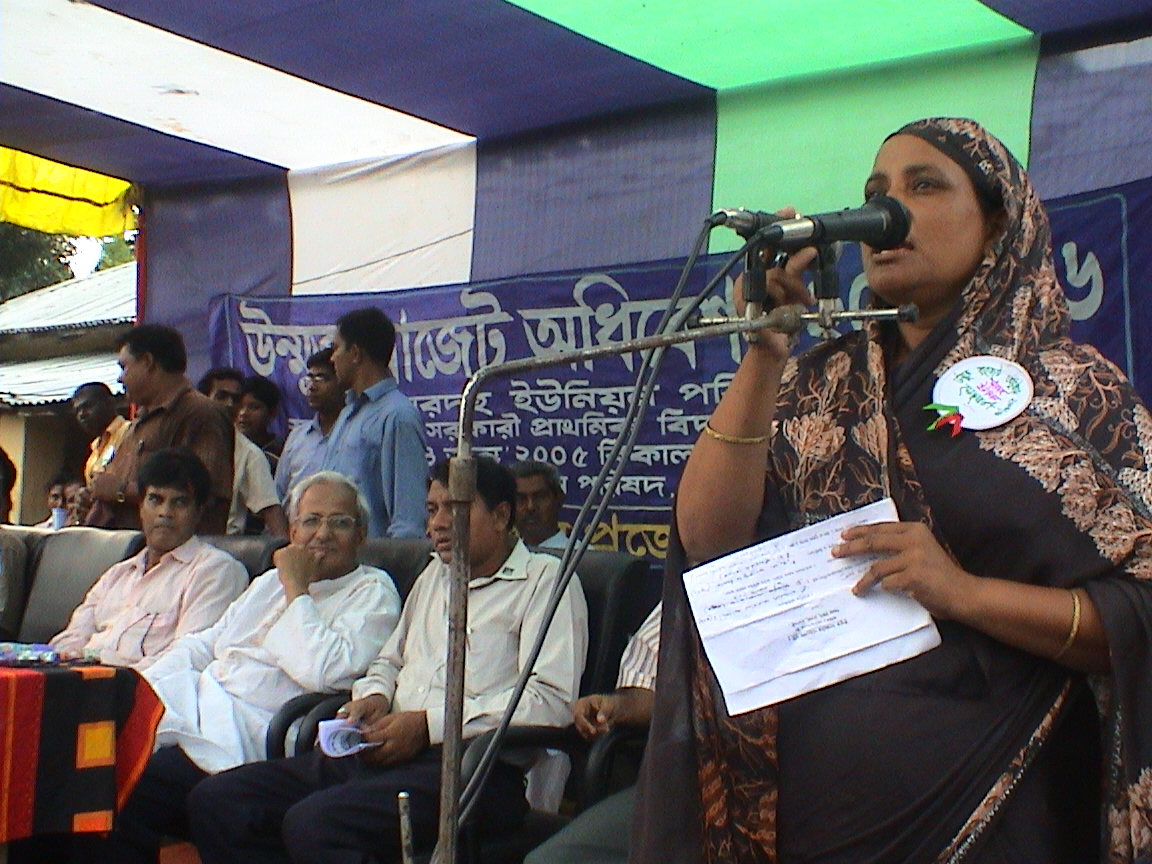The 2009 Local Government (UP) Act requires that Union Parishad’s hold Open Budget meetings. Prior to the law, this was a methodology for citizen engagement, transparency and social accountability piloted in Bangladesh by The Hunger Project.
Purpose of the activity
- To make the annual budget of the Union Parishad known to the public, the Union Parishad (UP) holds a public budget session and presents it in the presence of the concerned Standing Committee and the general public.
Facilitation – what type of person or team is required to facilitate the activity?
- The open budget meeting is organized and carried out by the concerned Union Parishad
- The budget is announced by the Chairman of the union council. Sometimes the UP Secretary announces the budget on behalf of the Chairman.
Preparation – what should be done before the activity?
- Since the budget has to be presented in the open budget meeting, the main task is to formulate the budget. In this stage, The Hunger Project influences the UP to prepare a constructive budget.
- In order to prepare the budget, Ward Shava (meetings) are held at least 60 days before the start of each financial year in the prescribed manner and priorities are determined on the basis of public participation. THP inspires the UP to call for Ward Shava and Open Budget Meetings.
- The draft budget is prepared by discussing in the meeting of the UP bodies through the recommendation of the Standing Committee on the priorities decided in the Ward Shava.
- After preparing the draft budget, the Union Parishad organizes pre-budget workshops with the concerned Standing Committee, NGO representatives, teachers, Imams, Qazis, businessmen, politicians and citizens of different walks of life.
- The draft budget is presented at the pre-budget workshop and the recommendations of all stakeholders are listed. On the basis of these recommendations, the overall aspect is reviewed and the budget is prepared at the next meeting of the Union Parishad.
- For the open budget meeting, the Union Council informs the public about the date, time and place of presenting the budget through miking. THP helps preparing the list of influential people to be invited and ensures their participation in the meeting by following up with them. THP also encourages these people to ask constructive questions regarding the proposed budget.
- A booklet is designed that contains a short description of the union, introduction of the Standing Committee, summary report of the UP’s previous year’s achievements and highlights, and budget and priorities for the upcoming year. THP provides technical and financial support (in some cases) for designing and printing of these booklets. On the day of the ceremony, these booklets are distributed to the public.
Participants – who should participate? How many in each session?
- Open budget meetings are usually held in public at the premises/fields of Union Parishad. All the people of the union are invited to attend. Generally, a minimum of 500 people and a maximum of 1,000 men and women participate in an open budget meeting.
Duration – how long does it take?
- 3-4 hours/ half a day
Financial cost items
- Pandal (canopy)
- Chairs
- Sound System
- Banner
- Publications
- Advertising costs
What are the “transformative” aspects of this activity? It shifts the mindset of participants from what to what?
- Citizens can learn about the annual budget of the Union Parishad
- Budget is prepared in a participatory process
- Citizens can identify the problems of the union
- Citizens can express their opinions about how to solve the problems
- Citizens are empowered by the feeling that they can play a role in budgeting
- Citizens become aware of their rights. Their sense of responsibility is awakened
- The role of citizens is enhanced to ensure transparency and accountability of the Union Parishad.
What are the content/factual learning objectives of the activity?
- How to increase public participation in developing the budget of the Union Parishad
- How to increase the local income/asset of the Union Parishad
- How to increase public participation in solving local problems
Flow: from “welcome” to “thank you” what are the spaces the participants are taken through? If there are “power questions” that prompt each step, what are they?
- Welcome speech
- Background explanation
- Presentation of income and expenditure statement for the current year
- Submitting the budget
- Distribution of the printed copies of the budget to the public
- Question answer session
- Budget approval
- Guest’s speech
- Chairman’s speech
- Closing remarks
Follow-up: what should happen after the activity and how will we record it?
- The progress of implementation of the announced budget is reviewed at the UP-body meetings
- After the open budget meeting, the Ward Shava also reviews the progress of budget implementation with the participation of the citizens
- In the open budget meeting of the following year, the income and expenditure accounts of the previous year are prepared and presented in the presence of the people.
- Data of these meetings and the decisions are documented and preserved by the concerned UP.


